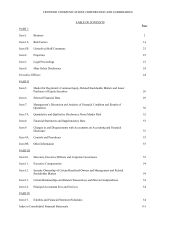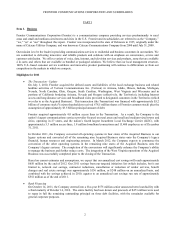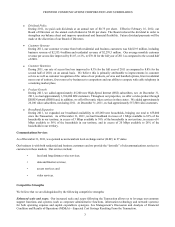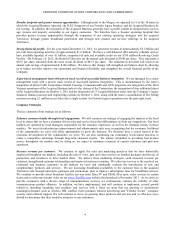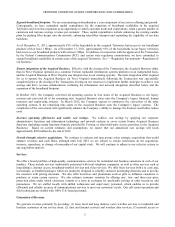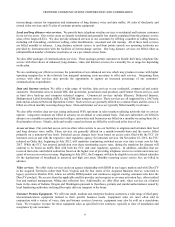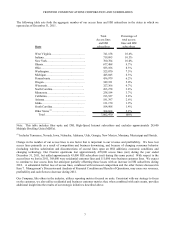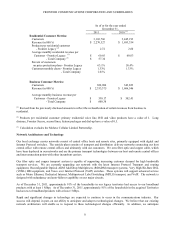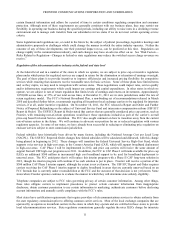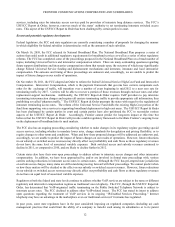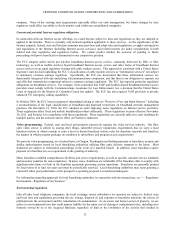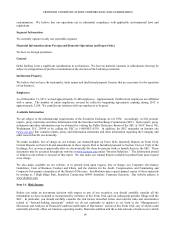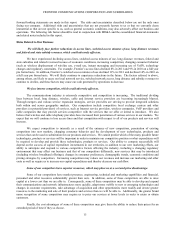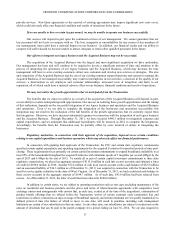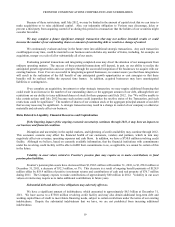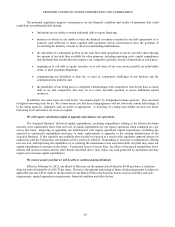Frontier Communications 2011 Annual Report Download - page 13
Download and view the complete annual report
Please find page 13 of the 2011 Frontier Communications annual report below. You can navigate through the pages in the report by either clicking on the pages listed below, or by using the keyword search tool below to find specific information within the annual report.FRONTIER COMMUNICATIONS CORPORATION AND SUBSIDIARIES
10
Regulatory Environment
The majority of our operations are regulated by the FCC and various state regulatory agencies, often called public service
or utility commissions.
Some of our revenue is subject to regulation by the FCC and various state regulatory agencies. We expect federal and state
lawmakers to continue to review and revise the statutes governing the level and type of regulation for telecommunications
services.
Regulation of our business
We are subject to federal, state and local regulation. We have various regulatory authorizations for our regulated service
offerings. At the federal level, the FCC generally exercises jurisdiction over facilities and services of common carriers,
such as our company, to the extent those facilities are used to provide, originate or terminate interstate or international
telecommunications services. State regulatory commissions generally exercise jurisdiction over common carriers’ facilities
and services to the extent those facilities are used to provide, originate or terminate intrastate telecommunications services.
In particular, state regulatory agencies have substantial oversight over the provision by incumbent telephone companies of
interconnection and non-discriminatory network access to competitive providers. In addition, local governments often
regulate the public rights-of-way necessary to install and operate networks, and may require service providers to obtain
licenses or franchises regulating their use of public rights-of-way. Municipalities and other local government agencies also
may regulate other limited aspects of our business, by requiring us to obtain construction permits and to abide by building
codes.
We believe that competition in our telephone service areas will continue to increase in the future as a result of the
Telecommunications Act of 1996 (the “1996 Act” or the “Telecommunications Act”) and actions taken by the FCC and
state regulatory authorities, and through increased deployment of various types of technology, although the ultimate form
and degree of competition cannot be predicted at this time. Competition may lead to loss of revenues and profitability as a
result of loss of customers; reduced usage of our network by our customers who may use alternative providers for voice and
data services; and reductions in prices for our services which may be necessary to meet competition.
Under the 1996 Act, state regulatory commissions have jurisdiction to arbitrate and review interconnection disputes and
agreements between ILECs and competitive local exchange carriers, in accordance with rules set by the FCC. State
regulatory commissions also may impose fees on providers of telecommunications services within their respective states to
support state universal service programs. Many of the states in which we operate require prior approvals or notifications
for certain acquisitions and transfers of assets, customers, or ownership of regulated entities.
In connection with granting their approvals of the Transaction, the FCC and certain state regulatory commissions specified
certain capital expenditure and operating requirements for the acquired Territories for specified periods of time post-
closing. These requirements focus primarily on certain capital investment commitments to expand broadband availability
to at least 85% of the households throughout the acquired Territories with minimum speeds of 3 megabits per second
(Mbps) by the end of 2013 and 4 Mbps by the end of 2015. To satisfy all or part of certain capital investment commitments
to three state regulatory commissions, we placed an aggregate amount of $115.0 million in cash into escrow accounts and
obtained a letter of credit for $190.0 million in 2010. Another $72.4 million of cash in an escrow account (with a cash
balance of $62.9 million and an associated liability of $14.3 million as of December 31, 2011) was acquired in connection
with the Transaction to be used for service quality initiatives in the state of West Virginia. As of December 31, 2011, $43.0
million had been released from these escrow accounts. In addition, as of this date, the letter of credit has been reduced to
$100.0 million. The aggregate amount of these escrow accounts and the letter of credit has decreased and will continue to
decrease over time as Frontier makes the required capital expenditures in the respective states.
In addition, in certain states, we are subject to operating restrictions such as rate caps (including maintenance of existing
rates on residential and business products and wholesale prices and terms of interconnection agreements with competitive
local exchange carriers and arrangements with carriers that, in each case, existed as of the time of the Transaction),
continuation of product bundle offerings that we offered before the Transaction, and restrictions on how early termination
fees are calculated, restrictions on caps on usage of broadband capacity, and certain minimum service quality standards for
a defined period of time (the failure of which to meet may result in penalties, including, in one state, cash management
limitations on certain of our subsidiaries in that one state). In one other state, our subsidiaries are subject to restrictions on
the amount of dividends up to the parent company for a period of approximately four years. We are also required to report



